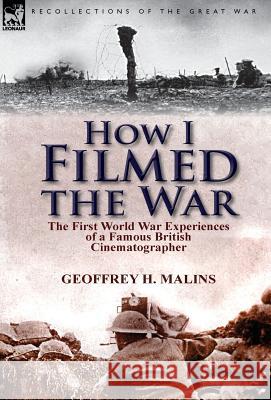How I Filmed the War: the First World War Experiences of a Famous British Cinematographer » książka
How I Filmed the War: the First World War Experiences of a Famous British Cinematographer
ISBN-13: 9781782821083 / Angielski / Twarda / 2013 / 264 str.
How I Filmed the War: the First World War Experiences of a Famous British Cinematographer
ISBN-13: 9781782821083 / Angielski / Twarda / 2013 / 264 str.
(netto: 137,04 VAT: 5%)
Najniższa cena z 30 dni: 132,67
ok. 16-18 dni roboczych
Dostawa w 2026 r.
Darmowa dostawa!
How the Great War came to the cinema screen
Everyone familiar with motion picture footage of the First World War on the Western Front will certainly have witnessed the talent, daring, uniquely invaluable and enduring work of the author of this book, Geoffrey Malins. Malins was one of two 'Official War Office Kinematographers' authorised to film the allied armies in action in France. There have been comments detrimental to Malins' character, he might have been guilty of embellishment as regards his own actions (no strange phenomenon in a military memoir) and he certainly downplayed the role of his colleague J. B. McDowell to the point of invisibility, but it is pointless to concentrate on the imperfections of the man when balanced against his indisputable achievements. One thing is certain, our knowledge of the Great War would be poorer without Malins. Here was a 'movie man' prepared to go into the danger zone to record the reality of the war of wire, the blood and trenches the ordinary 'Tommy' knew, while dragging around the most cumbersome equipment. His most famous film, 'The Battle of the Somme, ' filmed in 1916 and considered to be excessively graphic by many at the time, was viewed by over 20 million people and is shown on television to the present day. Despite producing some now well known fake 'over the top' sequences, Malins was responsible for the iconic footage of the blowing of the Hawthorn Crater and anyone interested in the Great War and the earliest days of war cinematography will be fascinated to read the story of how it came about. The exploits of Malins and his colleagues make no less gripping reading.
Leonaur editions are newly typeset and are not facsimiles; each title is available in softcover and hardback with dustjacket; our hardbacks are cloth bound and feature gold foil lettering on their spines and fabric head and tail bands.











